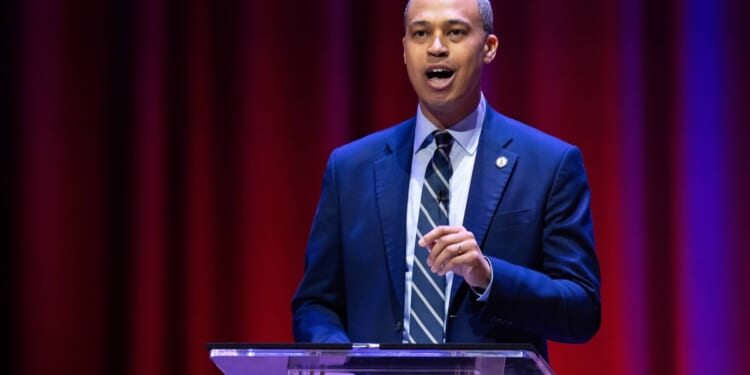
African radio station RTLM is now infamous for having helped sparked the Rwandan genocide in 1994. Dubbed “Hate Radio,” it would broadcast messages in which the target group, the Tutsis, were regularly characterized as “cockroaches.” Is such mainstreamed rhetoric coming to America?
Well, we’re getting closer, as many recent-years’ utterances attest. Said to be an example of this — though far from the best of the worst — is the recently unearthed text messages sent by Democratic Virginia attorney general candidate Jay Jones.
Referencing then-Virginia House Speaker Todd Gilbert (R), Jones made a joke involving a violent hypothetical.
“Three people, two bullets[;] Gilbert, hitler, and pol pot[;] Gilbert gets two bullets to the head,” Jones said. “Spoiler: put Gilbert in the crew with the two worst people you know and he receives both bullets every time.”
“I would p*** on [their] graves,” he also reportedly stated.
And why the animosity? “Gilbert and his wife [are] breeding little fascists,” he explained in a later text. “Fascists” — my, wherever did he get that from?
To be frank, Jones’ latter statement is far more troubling than the Hitler line, which is an old joke. Many people have used that joke, after all, to illustrate how bad they believe a given individual is. The incessant “fascist” agitation, however, is the kind of language that gets people killed (e.g., Charlie Kirk). Nonetheless, the remarks have proven a problem for Jones. In fact, one critic asks what it would take for the Democrats to withdraw support from him.
Answer: cratering poll numbers. Power is all most politicians care about.
Far From the Worst
That critic, Chris J. Krisinger, provides examples of Democrats carefully standing by Jones. Krisinger and many others are surprised the candidate is still viable. But should they be? As I illustrated in “Violence, Inc.: A Leftist Enterprise” (2020), progressives have said far worse without losing pocketbook or position.
For example, consider leftist ex-CNN host Reza Aslan. He tweeted in 2019 that all Trump supporters were Trump’s “evil racist scourge” who “must be eradicated from society.” Much farther back, in 1994, left-wing economist Julianne Malveaux wished death on Supreme Court Justice Clarence Thomas. “I hope his wife feeds him lots of eggs and butter and he dies early, like many black men do, of heart disease,” she told PBS at the time.
(Note: Malveaux later said this was just a joke, which is possible. Liberals are notorious for not being funny.)
Oh, this didn’t hurt her career one bit. In fact, she became a college dean in 2021.
As for Jones, again, he’s small potatoes in the hate department. For the record, too, he did not, as is commonly reported, wish death on Gilbert’s children. What he did do was text the following:
It would take Gilbert’s wife holding their dying children in her arms for him to act on gun safety legislation.
I emphasize this not because I’m in Jones’ corner, but because I’m in Truth’s corner. Traditionalists should not take the deceit leaf out of leftists’ book. (Much more damning about Jones is that he has facilitated the child “transgenderism” agenda; this constitutes indirect child abuse.)
For sure, however, is that leftists increasingly indulge what they might call “hate speech.” Hillary Clinton calling half of Trump’s supporters a “basket of deplorables” in 2016 is an example. Joe Biden characterizing MAGA philosophy as “semi-fascism” in 2022 is another.
Anatomy of a Civilizational Breakdown
So clearly, division, political violence, and incivility are rife, and intensifying, in America. The question is, though, how did we get to this point?
Now, it’s instructive here noting how violence often starts. An argument begins and gets increasingly heated, and tempers flare. Rudeness attends this, pejoratives and vulgarities are hurled, and shouting ensues. As it escalates, there’s then touching, which can quickly degenerate into shoving, punches thrown, and then a knock-down-drag-out. It’s a process, one that can manifest between two individuals, within a larger group, or even on the civilizational level. The last variant is what’s called widespread social unrest or civil war.
To prevent this, societies and governments have developed methods for interrupting that process early on. They’re called manners, etiquette, and rules of procedure. These traditions “intervene” before the shouting phase can even begin.
This is evident in government bodies, such as the British Parliament. Officials might address each other as “Right Honourable” even though many of them are neither right nor honorable. They also have other structured language and procedures, such as yielding the floor and addressing the speaker. This helps ensure orderly debate and fairness in turn-taking, to depersonalize arguments and keep the focus on policy, not ego. All this formality serves to reinforce decorum in adversarial settings and forestall verbal or physical escalation.
How Far We’ve Fallen
As for the social graces, they’re so important that Anglo-Irish philosopher Edmund Burke wrote most profoundly in 1796:
Manners are of more importance than laws. Upon them, in a great measure, the laws depend. The law touches us but here and there, and now and then. Manners are what vex or soothe, corrupt or purify, exalt or debase, barbarize or refine us, but a constant, steady, uniform, insensible operation, like that of the air we breathe in. They give their whole form and color to our lives. According to their quality, they aid morals, they supply them, or they totally destroy them.
And today? Well-mannered people seem almost quaint. Awash in moral relativism, many embrace the notion “Just be yourself,” even if this means being a boor. Vulgarity, part of the process toward violence, is mainstreamed, used by young and old, off air and on, with vigor. If you counsel against it, in fact, you’re treated as a nerd or killjoy. (You should read what George Washington had to say about it. It’s in my essay “Cussing & Cultural Decay.”)
So along with other traditions, manners have in general broken down. Worse news: Modern communication’s nature may make remedy elusive. I’m talking about the internet and social media.
Machine Communication
Face-to-face interaction, which once was almost all interaction, generally makes manners reflexive. When looking someone in the eye, seeing smiles and other expressions — experiencing his humanity — there’s emotional incentive to be polite. (This, not to mention the incentive of not wanting a punch in the mouth.)
The internet, however, is a cold medium. People are often nameless and faceless, anonymous entities that may as well be sentient AI. The walls of manners collapse, and they say things to each other they’d never utter in person. Rudeness and nastiness then snowball and become the norm.
Once sufficiently mainstreamed online, this incivility inevitably bleeds to an extent into the “real” world. Another effect is that people imbibing internet negativity and ne’er-do-well influences may become angry and radicalized and lash out. Just think here of Tyler Robinson, the young man charged with assassinating Charlie Kirk.
The bottom line is that if manners are more important than laws, as Burke said, then 21st-century America has become lawless in one of the worst and most destructive ways possible.











